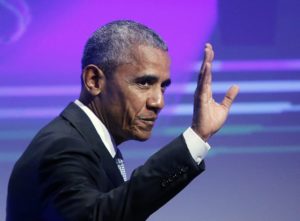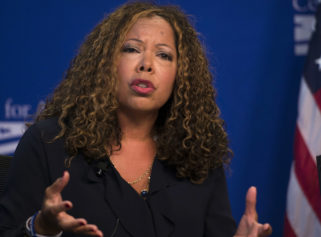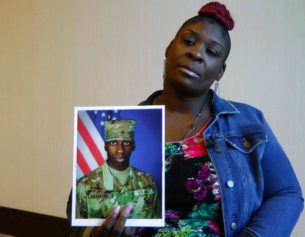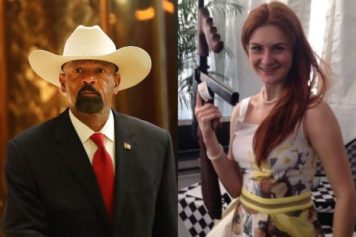
Former US President Barack Obama waving before he is awarded the German Media Prize 2016 in Baden-Baden, Germany. (AP Photo/Michael Probst, FILE)
The power of the Second Amendment, and the NRA, have ensured that even the increasing number of mass shootings aren’t enough to end America’s love affair with firearms. In fact, we’ve stubbornly pushed ahead, now accounting for 31 percent of all mass shootings globally.
As the frequency of these shootings has increased Congress has offered little more than “condolences and prayers” after each incident, more content to ensure the steady flow of political funding the NRA provides than to address the safety of the U.S. citizens often caught in the crosshairs of the ongoing gun control debate. In short, lawmakers have adopted a business is business policy that’s made it difficult to even introduce gun control measures, let alone implement them.
The election of President Obama made an already contentious issue an even more partisan one, thanks in part to right-wing allies eager to push the narrative that a “Muslim agitator would soon take away their guns.” When that didn’t happen the strategy changed, as each new massacre became a rebuttal for why Americans needed even more guns.
Tasked with responding to more mass shootings than any of his predecessors — including the 2012 Sandy Hook Elementary School and 2016 Pulse nightclub massacres — and despite his pushing for federal gun legislation, Obama largely came up short, with NPR reporting that almost 11 million guns were produced in America in the year following Sandy Hook alone.
Sandy Hook, in particular, brought gun control to the forefront again, as Obama lamented during his speech at the prayer vigil for Newtown shooting victims that “We will be told that the causes of such violence are complex, and that is true. No single law — no set of laws can eliminate evil from the world, or prevent every senseless act of violence in our society. But that can’t be an excuse for inaction. Surely, we can do better than this.”
At the time it was a sentiment that even Donald Trump — who was hosting “The Apprentice” — could get behind, with Trump tweeting: “President Obama spoke for me and every American in his remarks in #Newtown Connecticut.”
Still, business kept on booming. A fact that gun show organizer John Lamplugh discussed shortly after the 2015 San Bernardino mass shooting, telling NPR, “After San Bernardino, our business went up probably 50 percent. It’s either two things: They’re scared and need to protect themselves. Or they’re afraid that the government is going to take it from them. There are the two things that drive our business.”
Now there’s something driving business in a different direction. No longer fueled by the boogeyman of Obama, gun sales have started to decrease, indicating that some may not feel the same sense of urgency in the Trump era.
Brian Skinner, CEO of gun maker Kalashnikov USA, acknowledged the politics last year during an interview with CNN Money. “I think the entire gun industry was planning on, and I think the entire country was thinking, that Hillary was going to win,” he said.
He added, “And I know there was a huge demand, all the manufacturers had huge orders, and then the day after the election, distributors were canceling orders left and right just because they realized Trump’s coming in now.”
Those on the gun show circuit have already noticed a few changes, with some reporting a decrease in both sales and attendance. Recently, reporting from the Tanner Gun Show —which drew national attention last year after an accidental shooting — the Denver Post revealed how things have started to shift.
Although one official claimed, “We don’t do press,” which explains why their press page is not available, vendor Nick Nitu told the Post that sales and attendance were “a lot less than it used to be in the Obama days.”
But while traditional gun buyers may be showing restraint, a growing number of Black-owned gun courses and instructors are seeing increases of their own. Speaking with Atlanta Black Star, Eric Prince, Co-Founder of the Houston-based Total Precision Shooting LLC said, “Our company has noticed that with this administration, due to the present state of the union, more African-Americans have chosen to participate in the Second Amendment. We’ve actually seen our greatest increase amongst African-American women.”
“Our classes have increased drastically, especially in the DFW [Dallas-Fort Worth] area,” added co-founder, Deandrea Prince.
With the help of instructors like Prince, Black Americans are learning essential safety protocol in the process, necessary skills that may account for any rise in female ownership. There remains a gender disparity, with the Pew Research Center reporting that men are three times as likely as women, 37 percent versus 12 percent, to own a gun.
According to the National African-American Gun Association, between Election Day 2016 and February 2017 alone they gained 9,000 new members. Speaking with CNN early last year, the group’s national president explained “I’d be lying to you if I said Donald Trump hasn’t affected our numbers. They have jumped off the roof.”
“People feel that they have, perhaps, a president that they don’t feel is going to protect them, that’s there for them,” Kevin Jones, Ohio director of the National African-American Gun Association, told NBC News last May.
Jones is also the co-owner of Urban Sports Unlimited in Cleveland, a gun store he said had also seen an increase in African-American gun buyers, particularly women. Sharing his thoughts, he added, “People feel like they don’t have a voice in the government and that the government is changed to a point where it doesn’t care about protecting them,” he said. “It cares about something else completely. So when you have that, you’re going to have people losing confidence in police protection and losing confidence in their political structure and everything surrounding that.”
But numbers were on the rise before Trump entered office, with a 2014 Pew report revealing an increase in the number of Black Americans that feel “gun ownership does more to protect people than endanger personal safety” increased from 29 percent in 2012 to 54 percent just two years later. Still, some black gun sellers are reporting that they’ve seen an increase in inquiries, and sales.
Also speaking with NBC, Michael Cargill, owner of Central Texas Gun Works claimed his Austin-based store had seen a spike in calls. “We’re seeing people in the African-American and the LGBTQ community coming in and asking questions and they want to learn how to shoot, and then purchase a firearm and then get a license in order to carry it,” he said.
“It’s different this time, versus when President Obama was in office. Back then, people were saying, ‘Hey, I heard this was going to be banned, I want one of those,’ without any research at all. Now people are doing their research and making informed decisions,” Cargill explained.
For Houston resident and legal gun owner Ken Noble, the Second Amendment is a guaranteed right that more Black Americans should take advantage of. Speaking with Atlanta Black Star, he reasoned “We’ve been teaching our kids to learn how to play sports and handle a ball, when we should have been teaching them how to handle a firearm.”


